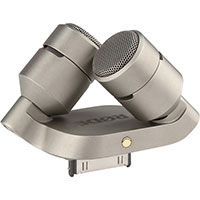 New from Rode is an iOS mobile microphone that connects via the charging/docking port. This is a new product, but still uses the older 30-pin connector, not the new port for the iPhone 5. There’s another version in the works that will support the iPhone 5. Since this mic uses the docking port instead of the 3.5 mm plug, you can record and use headphones to monitor live.
New from Rode is an iOS mobile microphone that connects via the charging/docking port. This is a new product, but still uses the older 30-pin connector, not the new port for the iPhone 5. There’s another version in the works that will support the iPhone 5. Since this mic uses the docking port instead of the 3.5 mm plug, you can record and use headphones to monitor live.
You can read more about this new product from Rode here: 24-Bit Microphone For iPhone and iPad: RODE iXY Stereo Mic
Recording Tips and Techniques
Create An Environment For Good Recording
Music has a lot to do with conveying emotion, so it’s no surprise that not everything about a recording can be fixed with technology and a good audio engineer. Get a good environment set up for your recording studio. Clear away the clutter and mess, and maybe even add some sentimental decoration to get you motivated. By having a recording area that keeps you in a good frame of mind, you’ll be able to start off on the right foot when recording.
You can read more tips here: http://therecordingrevolution.com/2013/01/11/3-psychological-hacks-to-a-better-recording/
Clearing Unwanted Distortion
Distortion has its place in music, but unwanted distortion can ruin a recording. Distortion can result from a microphone receiving too much sound. Think of someone on the other end of the phone screaming; their voice will be far from clear. Some simple solutions include moving the mic farther from the source, or even using a different type of microphone.
You can read more tips about distortion here: http://www.prosoundweb.com/article/church_sound_audio_distortion_–_finding_the_source_and_clearing_the_air/
Eliminating The Hum Of A Ground Loop
A ground loop is an electrical problem that can present as a noisy hum. Some musicians like to use a three-to-two pin converter plug as a quick fix for the problem, but that can remove the important safety features of using a grounded outlet. Start by plugging all of the equipment that will be handling your audio signal into a single power strip (be careful not to overload it!). This works because all of the ground lines in your gear will eventually lead to a single ground point, the wall outlet, eliminating any chance of a difference in electrical potential, which is the root cause of a ground loop.
You can read about other ways to avoid or fix a ground loop here: http://en.audiofanzine.com/recording-mixing/editorial/articles/banish-ground-loop-hum.html
When Are You A Producer
It may be your goal to be a producer, but where do you cross the line drawn between hobbyist and professional? The point comes with money. If someone is paying you for your production skills, you’ve done it! As the adage goes, if you’re good at something, don’t do it for free.
You can read more tips for up-and-coming producers here: http://www.prosoundweb.com/article/in_the_studio_how_do_you_become_a_producer/